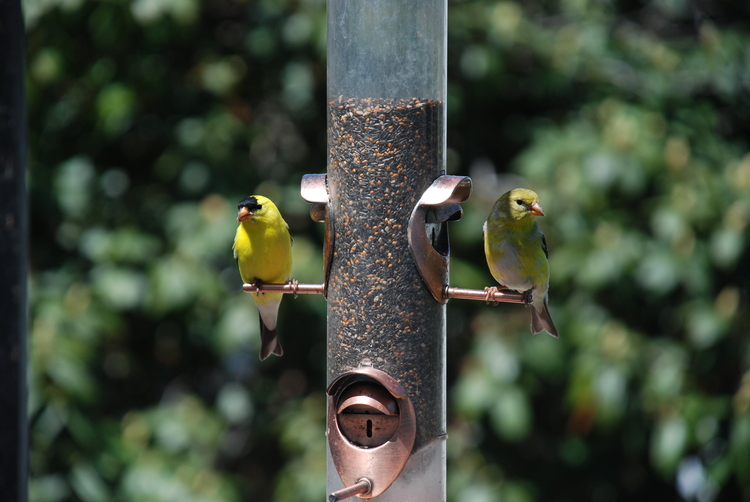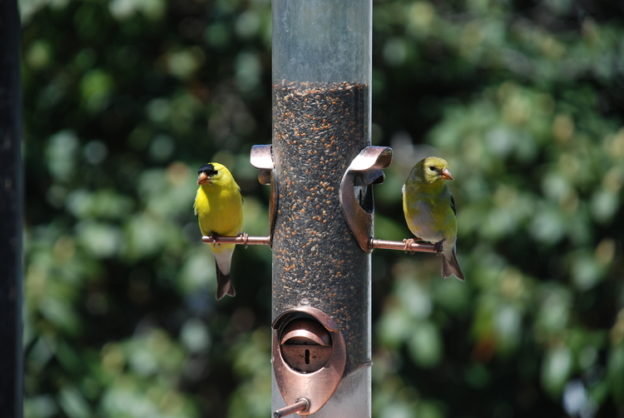Wonderful news! Based on declining reports of the mysterious avian disease in states to our south and the absence of confirmed cases in Massachusetts, we are following the lead of our neighbors and recommending it is safe to resume feeding birds.

Remember to Clean Those Feeders
The cause of this avian disease is still unknown, but we do know that contagious avian diseases can spread at feeders. To protect birds, stay in the habit of cleaning feeders every 2 weeks using a solution of one part bleach to nine parts warm water. Soak the feeder in the solution for a few minutes, rinse, and air dry. Visit our website for more tips and FAQs on bird-feeding.
Thank You for Heeding the Call
Taking in feeders and birdbaths was an important precaution to keep birds safe during a period of uncertainty. We understand that this was a difficult step to take, and we appreciate the help and patience of everyone who played it safe with us.
Other threats to birds still persist. While disease outbreaks aren’t uncommon, population-level bird declines are driven by habitat loss, climate change, and mortality from building strikes and outdoor cats. Mass Audubon is working to reduce these threats to birds through habitat management, land conservation, advocacy, and education.
To help us in this work, please support Bird Conservation at Mass Audubon.



This past winter I had 2 mated pairs of Bluebirds often visit my feeders daily, in late Fed 3 stray female Bluebirds suddenly appeared and stayed until early April. Both mated pairs of Bluebirds nested nearby and successfully raised 2 broods of 4 offspring each (16). In mid August 1 pair of Bluebirds showed up with 3 new fledglings, the other pair had 2 new fledglings for a few days. August 16-17th they all suddenly disappeared and I’ve only once seen a lone make Bluebird since.
I noticed that the Catbirds, Orioles and Robins disappeared too but the Cardinals, Chickadees, Nuthatches and Titmouse remained. I was baffled as to why or where the missing birds disappeared to.
I washed the Bluebird’s feeding bowls every night and provided them fresh P-butter suet daily, my birds appeared strong and healthy. I haven’t seen any obviously ill or dead birds around here, now I wonder If the Bluebirds are victims of the avian disease.
now I wonder if they died from the Avian disease
Many species disperse in late summer after their young fledge– territory boundaries loosen, and everything gets shaken up a little bit. This is also sadly a time of year with a lot of natural mortality from other diseases, like salmonella, conjunctivitis, and parasites. With all this in the mix, and with no cases of the mystery disease confirmed in MA, it’s unlikely that it was the culprit. I hope your bluebirds and robins come back soon, and that you see your catbirds and orioles next year!
My husband just went out to fill our tube feeder and a male goldfinch was eating. It never left the perch when he took the feeder off the post. He could see one eye was goopy but the other eye looked ok. The goldfinch flew up into a nearby tree. I will take my feeders down again. I live in Haverhill.
Hello Just want to report that we here in Oakham Ma within the past few days have found 2 dead birds. A chickadee and a bluejay , and about a month ago found another dead bluejay. Not sure wheather to start feeding the birds again or not? Any advice?
If you notice more than one dead or diseased bird on your property over a few days, it’s always best practice to take bird feeders in for a couple of weeks (and clean them thoroughly, and wash your hands carefully). Feeders can facilitate the spread of a wide range of diseases, and local outbreaks of salmonella or other bacterial infections are not all that rare in Mass. But it’s unlikely any bird deaths right now are caused by the mystery illness from the past summer.
Today, Sep. 3 I saw a sparrow in my yard (Marlborough) that had the crusted closed eye that resembled some of the pictures of birds with the mysterious disease. : (
Thank you for keeping us informed! I will fill those feeders again starting tomorrow. I cannot wait to see the birds again!
Hi William,
Thank you for letting us know we can once again feed the birds. Our backyard has been very quiet without the birds and animals that had become accustomed to the bird seed.
All the best,
Cynthia and John McDonough in Canton.
I wish the researchers were able to ascertain the cause of the illness. I am really not comfortable putting the feeders back up in the absence of a cause.
Yes, Marsha, it has definitely left many long-time birders at Mass Audubon uneasy too. It’s possible the disease is now endemic and just persists at low levels, or– we hope– that it was caused by an environmental or temporary ecological change, and has disappeared entirely. But it is no longer affecting birds in the south in any significant numbers, and it was never confirmed in Mass. We’ve put some feeders back out, but it’s totally okay to still want to be cautious!
Thank you Michael O’Connor and MASS AUDUBON !!! I am so glad to have my friends back and cannot wait to get those feeders filled and the bird bath flowing with precious water. I am over the top thrilled and grateful for these creatures who keep my heart full of joy.
Thank you Mass Audubon. We are forever grateful to you and for you do!
Thank you! Our puzzled feathered friends will be happy to see water once more in their birdbaths.
Thank you. Great News! It’s been so sad and quiet without the bird bath. I wish I could explain to the birds, that it was for their safety.
Thank you, William for your diligent work. The feeders and baths are back up and running.
Thank you !!!!!
Awesome news!!
I’m thrilled to hear this awesome news.
WELCOME BACK CARDINALS, Blue birds chickadees
Red headed woodpecker woodpecker‘s everyone is welcome except for the grackles thank you
Yippee
Annie BL ?
Thank you, William and Mass Audubon for the early warnings and the information provided throughout these months. Very much appreciated.